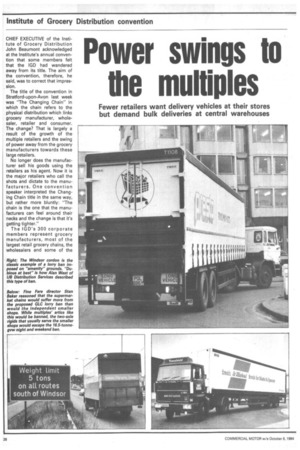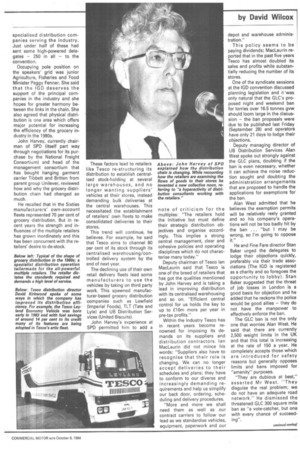Power swings to the multiples
Page 32

Page 33

If you've noticed an error in this article please click here to report it so we can fix it.
Fewer retailers want delivery vehicles at their stores but demand bulk deliveries at central warehouses
CHIEF EXECUTIVE of the Institute of Grocery Distribution John Beaumont acknowledged at the Institute's annual convention that some members felt that the IGD had wandered away from its title. The aim of the convention, therefore, he said, was to correct that impression.
The title of the convention in Stratford-upon-Avon last week was "The Changing Chain" in which the chain refers to the physical distribution which links grocery manufacturer, wholesaler, retailer and consumer. The change? That is largely a result of the growth of the multiple retailers and the swing of power away from the grocery manufacturers towards these large retailers.
No longer does the manufacturer sell his goods using the retailers as his agent. Now it is the major retailers who call the shots and dictate to the manufacturers. One convention speaker interpreted the Changing Chain title in the same way, but rather more bluntly: "The chain is the one that the manufacturers can feel around their necks and the change is that it's getting tighter."
The IGD's 300 corporate members represent grocery manufacturers, most of the largest retail grocery chains, the wholesalers and some of the specialised distribution companies serving the industry. Just under half of these had sent some high-powered delegates — 250 in all — to the convention.
Occupying pole position on the speakers' grid was junior Agriculture, Fisheries and Food Minister Peggy Fenner. She said that the IGD deserves the support of the principal companies in the industry and she hopes for greater harmony between the links in the chain. She also agreed that physical distribution is one area which offers major potential for increasing the efficiency of the grocery industry in the 1980s.
John Harvey, currently chairman of SPD (itself part way through negotiations for its purchase by the National Freight Consortium) and head of the management consortium that has bought hanging garment carrier Tibbett and Britten from parent group Unilever, reviewed how and why the grocery distribution chain had changed so much.
He recalled that in the Sixties manufacturers' own-account fleets represented 70 per cent of grocery distribution. But in recent years the strength and influences of the multiple retailers has grown inordinately and this has been concurrent with the retailers' desire to de-stock. These factors lead to retailers like Tesco re-structuring its distribution to establish centralised stock-holding at several large warehouses, and no longer wanting suppliers' vehicles at their stores, instead demanding bulk deliveries at the central warehouses. This necessitated the establishment of retailers' own fleets to make consolidated deliveries to their stores.
This trend will continue, he believes. For example, he said that Tesco aims to channel 80 per cent of its stock through its centralised warehousing/controlled delivery system by the end of next year The declining use of their own retail delivery fleets lead some manufacturers to use the vehicles by taking on third party work. This spawned manufacturer-based grocery distribution companies such as Lowfield (Imperial Foods), TLT (Tate and Lyle) and UB Distribution Services (United Biscuits).
John Harvey's experience at SPD permitted him to add a note of criticism for the multiples: "The retailers hold the initiative but must define their strategic distribution objectives and organise accordingly. This implies a strong central management, clear and cohesive policies and operating disciplines which do not characterise many today."
Deputy chairman of Tesco Ian MacLaurin said that Tesco is one of the breed of retailers that has got the qualities mentioned by John Harvey and is taking a lead in improving distribution with its centralised warehousing and so on. "Efficient central control for us holds the key to up to £10m more per year in pre-tax profits."
Within the Industry Tesco has in recent years become renowned for imposing its demands on its suppliers and distribution contractors. Ian MacLaurin did not mince his words: "Suppliers also have to recognise that their role is changing. We can no longer accept deliveries to their schedules and plans; they have to conform to our diverse and increasingly demanding requirements and help us simplify our back door, ordering, scheduling and delivery procedures.
"More and more we shall need them as well as our contract carriers to follow our lead as we standardise vehicles, equipment, paperwork and our depot and warehouse administration."
This policy seems to be paying dividends; MacLaurin re ported that in the past five years Tesco has almost doubled its sales and profits while substantially reducing the number of its stores.
One of the syndicate sessions at the IGD convention discussed planning legislation and it 'was only natural that the GLC's proposed night and weekend ban for lorries over 16.5 tonnes gvw should loom large in the discussion — the ban proposals were due to be published last Friday (September 28) and operators have only 21 days to lodge their objections.
Deputy managing director of UB Distribution Services Alan West spoke out strongly against the GLC plans, doubting if the ban is even necessary, whether it can achieve the noise reduction sought and doubting the administration arrangements that are proposed to handle the applications for exemptions for the ban.
Alan West admitted that he believes the exemption permits will be relatively reely granted and so his company's operations will not be too badly hit by the ban ... "but I may be wrong, so I'm going to oppose it." .
He and Fine Fare director Stan Baker urged the delegates to lodge their objections quickly, preferably via their trade associations (The IGD is registered as a charity and so foregoes the opportunity to lobby). Stan Baker suggested that the threat of job losses in London is a good basis for objection and he added that he reckons the police would be good allies — they do not have the manpower to effectively enforce the ban.
The GLC ban is not the only one that worries Alan West. He said that there are currently 2,500 weight limits in the UK and that this total is increasing at the rate of 150 a year. He completely accepts those which are introduced for safety reasons but generally opposes limits and bans imposed for "amenity" purposes.
"They are dubious at best," asserted Mr West. "They disguise the real problem; we do not have an adequate road network." He dismissed the threatened GLC 300 square mile ban as "a vote-catcher, but one with every chance of succeeding".




























































































































































